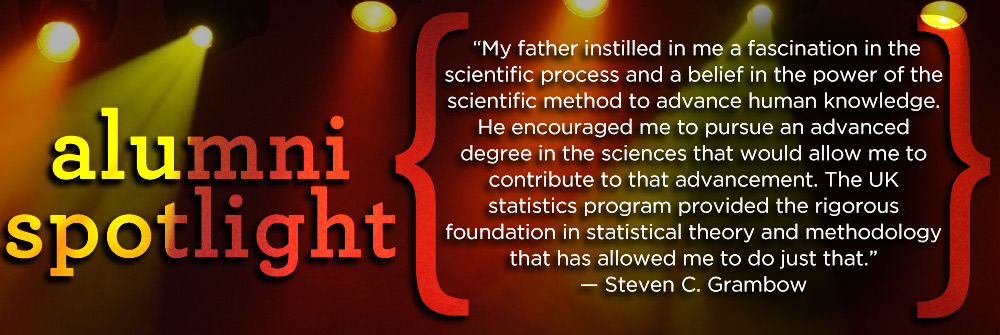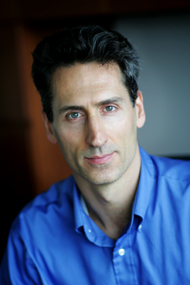
The son of a naval architect/marine engineer, Steven C. Grambow credits his father for putting him on the path to hard sciences.
“He was my biggest influence. At a relatively young age he was the chief engineer and naval architect of a World War II Navy Shipyard in Sausalito, CA that at its peak had over 20,000 employees. He went on to have a long and successful career as an engineer and project manager in international mining and minerals. He had a brilliant mind and enjoyed studying math, physics and general science as a hobby. It definitely rubbed off on me.”
 Grambow grew up in Northern California and started college at UCLA, decided to take a break for a year, and then finished his undergraduate math degree (with an emphasis in statistics) at California State University at Chico.
Grambow grew up in Northern California and started college at UCLA, decided to take a break for a year, and then finished his undergraduate math degree (with an emphasis in statistics) at California State University at Chico.
“One of my stats professors at Chico, Neil Schwertman, one of the early graduates from the UK Statistics Department, had a history of sending Chico State math degree grads to the UK Stats program. I believe I was probably somewhere between the tenth to fifteenth student from Chico to attend the UK stats program because of him,” Grambow said.
“As an undergraduate math major, Schwertman and Nancy Carter (another stats professor at Chico) were both instrumental in directing me from general mathematics toward statistics. They told me about the applied nature of statistics and its applicability across multiple fields, all with interesting applied problems that could be solved with statistics,” Grambow noted.
He credits three professors at UK who guided him along the way: Arnold Stromberg, Kert Viele and Richard Kryscio. The three, he said, provided invaluable guidance and advice.
“Dr. Stromberg was my doctoral advisor and was instrumental in providing guidance on my dissertation, helping me stay on track, and work efficiently. He was always engaged and full of ideas.
“Dr. Viele was extremely supportive during my time at UK. Writing a dissertation is at times an arduous task and Dr. Viele was an invaluable resource, always willing to make time to talk through problems, providing advice on how to solve a problem or organize thinking about a topic. We had a running joke about him serving as the ‘sanity monitor’ for dissertation students because he stayed in touch with how students were progressing on their work, offering words of encouragement and moral support when they were frustrated or just plain tired of working on their dissertation.
“Dr. Kryscio taught the consulting course and was also my research assistantship mentor when I was serving as a statistical consultant to the College of Agriculture. I learned an incredible amount from him about the practical experience of consulting with scientists from other disciplines and about analyzing real world data that just isn’t covered in any other class. I still find myself using things in my daily work that I learned from Dr. Kryscio.”
Grambow lives in Durham, NC, with his wife, Holly, a family physician, and two sons. He holds a joint position as a senior statistician at the Center for Health Services Research at the Durham VA Medical Center and as an assistant professor in the Department of Biostatistics and Bioinformatics at Duke University Medical Center.
He collaborates with clinical faculty conducting health services research studies, taking responsibility for statistical design and analysis of the studies. Grambow said the core research mission of the Center for Health Services Research is to develop strategies that enhance the delivery, quality, and cost-efficiency of primary care among veterans. Some areas of collaboration include weight loss interventions, substance abuse treatment, smoking cessation, osteoarthritis treatment, quality of colorectal cancer care and occurrence of Amyotrophic Lateral Scerlosis (ALS or Lou Gehrig’s disease) among veterans of the Gulf War.
“The collaboration generally starts at the grant writing stage and carries through to implementation and conduct of the study and ultimately to the writing and publication of research articles following the conclusion of the study. In my work at the VA and Duke, I have co-authored more than 45 peer-reviewed journal articles,” Grambow said.
“At the VA, I like that my statistical training provides me with the opportunity to contribute to a laudable mission: research projects focused on the important goal of improving the health and care of our nation’s veterans,” he said.
After the Gulf War, the VA directed his center to undertake a study to determine if there was an association between deployment to the Persian Gulf and increased incidence of ALS. “Our study was the first to establish that there was increased incidence of ALS among veterans deployed to the Persian Gulf and led to the immediate designation of ALS as a service-connected disease covered by VA benefits,” Grambow said.
At Duke, analogous to his role at the VA, he serves as a statistical co-investigator on a variety of clinical, health services and epidemiological research studies. He’s also associate director in charge of curriculum development and a teaching faculty member in the Duke Clinical Research Training Program (CRTP), a professional degree program designed primarily for clinical fellows who are training for academic careers in clinical research.
“I enjoy what I do and want to continue as a collaborative statistical researcher, contributing to the advancement of clinical science research programs at both the VA and Duke. Within the CRTP program, we have several ongoing projects related to this goal. It’s my hope to continue to develop these projects into mature and valued curriculum programs that will increase understanding of statistical concepts and their appropriate application in the clinical research setting and ultimately lead to improving the quality of clinical research investigations,” he explained, adding he’s also interested in writing an introductory statistical textbook tailored to the clinical research setting in an academic medical center environment.
“My father instilled in me a fascination in the scientific process and a belief in the power of the scientific method to advance human knowledge. He encouraged me to pursue an advanced degree in the sciences that would allow me to contribute to that advancement,” he said. “The UK statistics program provided the rigorous foundation in statistical theory and methodology that has allowed me to do just that.”
